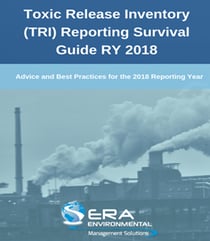 In a market in which companies becoming more aware of the value of corporate social responsibility (CSR), many businesses should realize that TRI reporting (Toxic Release Inventory) is an important part of their corporate social responsibility planning.
In a market in which companies becoming more aware of the value of corporate social responsibility (CSR), many businesses should realize that TRI reporting (Toxic Release Inventory) is an important part of their corporate social responsibility planning.
Do you view TRI reporting as a burden, or as an opportunity? Have you thought about communicating your TRI reporting as part of your corporate social responsibility program?
While many businesses see TRI reporting as an annual hassle or frustrating expense, it can actually have a silver lining when viewed through the lens of corporate social responsibility.
The basis of TRI reporting is the American public’s right to know about the quality of their water and air. For this reason the EPA is constantly researching and updating TRI substance regulations.
TRI reporting is one of the most public and visible ways that a business can respect this public right to know while also satisfying federal EPA environmental regulations. Proper TRI reporting not only protects your facility from paying fines for regulatory violations, but also demonstrates you’ve committed to operating transparently and in the public’s best interest.
TRI reporting is also a key indicator that your business is actively engaged in the process of monitoring and reporting its environmental impact. Taking this process seriously says a lot about your company and the way you do business.
In the CSR marketplace, it’s not enough to just be environmentally responsible, it needs to be communicated, particularly since those facilities that fail to report are publicly listed on the EPA ECHO list for 3 years.
Not only does submitting an EPA TRI report act as a method of communicating your environmental compliance, not submitting a report generates negative PR by advertising your lack of corporate social responsibility. That's why businesses are always looking for TRI reporting strategies to stay off the EPA's ECHO list.
Viewing your TRI reporting obligations only as part of your environmental compliance is ignoring the CSR possibilities of regulatory reporting and the many benefits that your business could be tapping into.
Arguably the most important is that proper TRI reporting generates the kind of positive public perception that will allow you to grow your business into larger markets. Because of your responsible EPA TRI report history, you will be less likely to encounter NIMBY-ism when it comes to further expansion, as the public will already have proof your business is both environmentally and socially responsible.
Ultimately, the EPA TRI report is a useful way of demonstrating your transparency, responsibility, and integrity to your market that is already built into your annual environmental management plans.

Want a free guide to TRI reporting? The TRI Survival Guide gives you everything you need to know about Toxic Release Inventory reporting.
- - The latest changes to TRI regulations.
- - How to avoid common TRI mistakes.
- - Red flags the EPA uses to catch and audit you.
Tags:
TRI
December 9, 2011



Comments